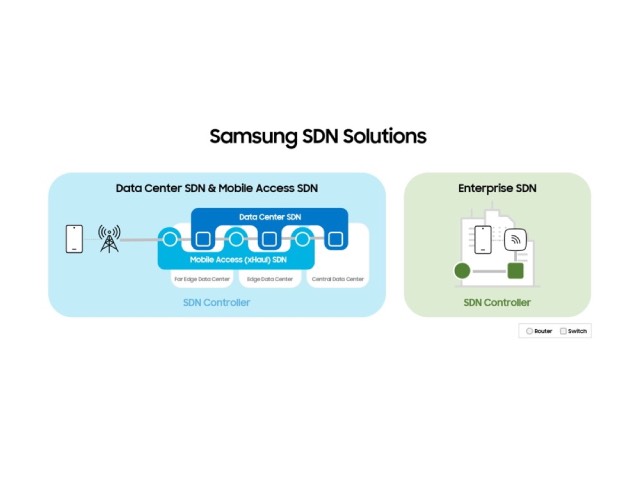Samsung’s latest Software-Defined Networking (SDN) solutions to power private 5G networks, bringing greater flexibility through centralized management and end-to-end automation
Samsung Electronics today announced it is expanding its portfolio of Software-Defined Networking (SDN) solutions with new capabilities designed to help mobile operators and enterprises manage networks more easily. Samsung’s SDN portfolio already supports data center operations. With expanded capabilities, Samsung’s new SDN solutions will power enterprises in various sectors, including education, retail and energy. This full lineup of SDN will also support mobile access (xHaul), which refers to fronthaul, midhaul and backhaul transport networks.
SDN is a network architecture approach that enables the network to be centrally and intelligently controlled using software solutions. This centralized approach will offer greater automation and programmability in the entire network from access to the core, increasing operational efficiency. With architectural shift from a hardware-based deployment to software-centric network design, SDN is highly secure, scalable and adaptable, especially helpful in advancing private networks.
Samsung’s SDN portfolio covers all layers of the SDN architecture including controllers, orchestrators, switches and routers. Key benefits of Samsung’s SDN include:
- “SDN In-a-Box”: Samsung’s SDN solution can serve multiple purposes in a single box, including data center SDN, enterprise SDN and mobile access (xHaul) SDN.
- User-Friendly: This SDN delivers a user-friendly, award-winning 3D-based UX design.1 With high accessibility and usability, this solution provides a simplified view of an end-to-end network, enabling more unified and consistent management.
- Openness: The company’s cloud-native, open source-based SDN solutions can integrate seamlessly with third-party switches and routers. Samsung’s SDN is based on the Open Network Operating System (ONOS), supporting various types of open interfaces to enable multi-vendor interoperability.
- End-to-End Network Slicing: SDN technology can automate network slicing end-to-end, which will help fulfill service-level agreement (SLA) requirements, even at the transport level. Combined with its RAN and Core, Samsung’s SDN solution will enable mobile operators to offer optimal networks for various business models through company’s end-to-end network slicing capability.
“Networks are becoming more agile with SDN technology in the 5G era. Samsung is proud to take part in this network evolution by offering a full lineup of SDN solutions and bringing more operational flexibility to 5G network management,” said Sohyong Chong, Senior Vice President and Head of Software R&D, Networks Business at Samsung Electronics. “Samsung’s SDN will help operators and enterprises rapidly introduce new 5G applications, services and infrastructures, driving faster time to market.”
Samsung has pioneered the successful delivery of 5G end-to-end solutions including chipsets, radios, and core. Through ongoing research and development, Samsung drives the industry to advance 5G networks with its market-leading product portfolio from fully virtualized RAN and Core to private network solutions and AI-powered automation tools. The company is currently providing network solutions to mobile operators that deliver connectivity to hundreds of millions of users around the world.






































